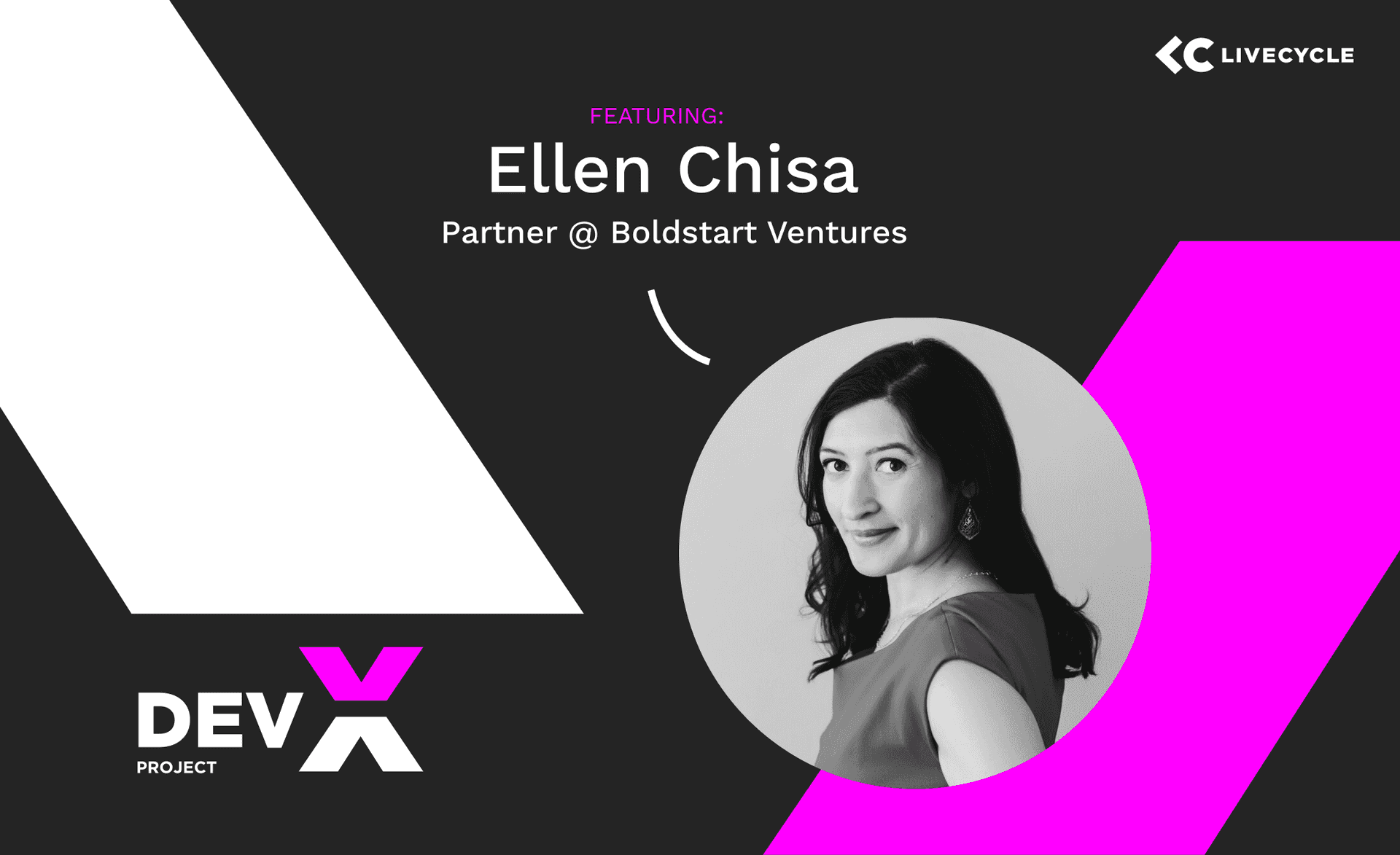The Dev-X Project is a series of features with industry leaders sharing their developer experience insights. In each “episode”, we ask an industry leader 10 interesting questions about DX, collect their responses and insights and share them with you.
In this episode, we’re featuring Ellen Chisa, Partner at Boldstart Ventures, angel investor, and engineer. Ellen co-founded Dark, a programming language coupled to its editor and infra. For fun, she read lots of books, and also can talk at length about triathlons, Peloton, crossword puzzles, cooking, baking, and cocktails.
You can follow Ellen on LinkedIn and Twitter
When did you decide to become a developer?
I’m not sure if I ever really made a specific decision! I knew I wanted to be an engineer after doing FIRST Robotics in high school.
I liked having to think through all three components:
- What would the best thing to build be?
- What would be the best way to design it?
- How do I physically do it?
At first that was a lot of CAD, machining, circuits and soldering. Later, in university, I really started liking software because it had way quicker loops, and scaled far further. You can try something and see if it works pretty much immediately.
What are the key ingredients to a really good engineering culture?:
Great question. I think this is the same for me across the board - everyone looking to do 1) impactful work, 2) making decisions, 3) including others (being collaborative), and 4) reflecting on what did and didn’t work to make improvements. I could definitely throw out other words like respect, or continuous improvement, but I think all of those end up being true if those first four conditions are met.
Let’s say you’re building something from scratch. What does your ideal stack look like?
This dates me, but after learning things like Perl and C, I loved getting to build quickly with Ruby, Rails, Heroku, and Github. Of those, I feel like only Github has really stuck around and I’d probably want to do something with Redwood.js and Render. That might be cheating because Redwood includes parts of React, TypeScript, and GraphQL, but I’ll go with it.
Tell us about an epic engineering fail you’ve experienced in your career. What did you learn from it?
it’s been so long that I can’t even remember the gory details. But, TL;DR, my first startup was when five friends and I dropped out of undergrad and spent a year building a learning management system (like Blackboard) for middle schoolers. We built it in CakePHP. Somehow we got to the point of having three alpha classrooms using the software, and then somehow lost all of their data. All of it. We never got it back. We all ended up going back to undergrad and finishing and doing other stuff now, but I’m still at a bit of a loss of how we screwed up that badly. That was what motivated me to go to Microsoft because I figured they’d never make a mistake like that and I might be able to avoid it in the future.
How important is “Developer Experience”? Do you see this as a trend that will evolve into dedicated teams/functions for mainstream tech companies?
I think developer experience is the radical idea that developers deserve good UX too. I think we’ve seen over the years how much design differentiates consumer and SaaS products. While the specific implementation is different when we optimize for developers, the underlying value is the same. Products that have great Developer Experience will win.
Let’s take the mono-repo question once and for all - should you ‘go mono’?
Ugh. It depends.
What will be the hottest dev trend/adopted technology in the next 12-24 months?
Maybe I need to change my mono-repo answer for this, but I think Turborepo will be huge, or also more incremental build processes in general. None of us have time to sit around and wait. Shameless plug since I invested, but I also think we’ll see a lot more multiplayer experiences, especially as tooling like Liveblocks enables them. To make up for the shameless plug, here is a cool technical blog post: https://liveblocks.io/blog/how-to-build-undo-redo-in-a-multiplayer-environment
Some claim that front-end developers will become irrelevant in the future of no-code tools. Do you see this happening? If so, how soon?
Absolutely not! I have yet to see no code really turn into usable frontend components. On top of that, I think we’ll always want to get under the hood to customize. I think low code experiences like Zapier impact the backend more than the frontend.
Share some tips to help remote teams collaborate better.
Spend time together when you can! I think some of the best things happen when teams can get together for an offsite and then go back to collaborating remotely. On a day-to-day basis, I love using reclaim.ai to sync my status to Slack so people know if I’m heads down or more interruptible.
Do you want to share anything else? Please share anything you think would be of value to the broader developer community:
When you’re building something for other devs, get someone else to try it as quickly as possible. There’s no universal “good developer experience” so your intuition will only get you so far.
Do you have DX wisdom to share? Apply to get featured in an upcoming Dev-X Project episode.

